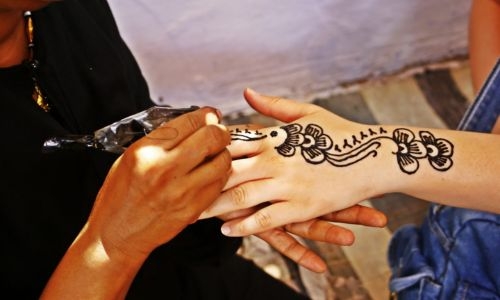Bahrain dermatologist warns against use of black henna
TDT | Manama
The Daily Tribune – www.newsofbahrain.com
Report by Zahra Ayaz
Amidst the current surge in popularity surrounding the application of black henna, a leading dermatologist in Bahrain strongly urges the public to refrain from using it on their skin or scalp.
She expresses concerns regarding the possibility of allergic reactions and underscores the critical importance of seeking immediate medical attention if any adverse symptoms arise.
Black henna, a synthetic form of henna dye, has gained popularity due to its dark and long-lasting stain. However, its chemical composition poses significant risks to skin health.
Speaking to The Daily Tribune, Dr. Anitta Sara Thampi, a dermatologist at Bahrain Specialist Hospital, said: "Black henna derives its deeper colour from the many colouring agents added to it to enhance the dark colour in it.
Among these, para-phenylenediamine, commonly known as PPD, is considered one of the main culprits responsible for the adverse reaction caused by black henna.
She continued, "These colouring agents are known to provoke severe skin reactions, from allergic reactions localised to the area of application to severe hives and anaphylaxis to pigment deposition into the deeper layers of the skin, eventually leaving behind severely pigmented skin.
Dr. Anitta urges individuals who have already applied black henna and experience any adverse reactions to seek medical attention promptly.
Mrs. Rachna Thakker has been a pioneer of Arabic henna designs for the last 43 years in the Gulf region, having a well-established business, and in Bahrain for the last 30 years.
The henna artist and owner of Rachna’s Henna Salon shared her perspective with The Daily Tribune regarding the ongoing trend of applying black henna.
She mentioned that black henna has gained popularity because it resembles a temporary tattoo due to its dark colour.
Mrs. Rachna emphasised that at her salon, they prioritise customer safety.
When a customer expresses interest in applying black henna, they make sure to inform them about the associated risks. They conduct a patch test to check for any allergic reactions.
Additionally, they have customers sign a document stating that the salon will not be held responsible for any skin issues that may arise.
Mrs. Rachna’s staff also advises customers about the potential harm black henna can cause to the skin and suggests using natural henna as a safer alternative.
"It is rare for customers to experience allergic reactions when using henna. However, individuals with sensitive skin or children may be more susceptible," she pointed out.
Mrs. Rachna Thakker, pioneer of arabic henna design
Dr. Anitta Sara Thampi, Dermatologist
Related Posts



